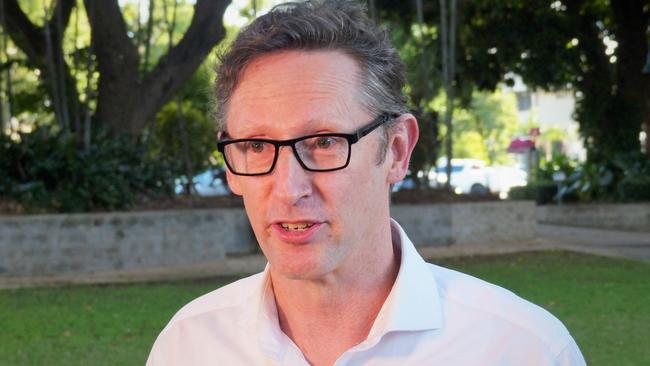Super funds have big role to play in financial advice
Glenda Korporaal interviews the federal Financial Services Minister Stephen Jones about his ongoing reform plans.

Glenda Korporaal: You have a lot on your plate when it comes to reforming the regulations around the financial advice sector. Where are things at the moment?
Stephen Jones: People have been focusing on Michelle Levy’s Quality of Advice Review, but we have a project of work around qualifications for financial advisers. I have to look at things from the perspective of what consumers need. There is a shortage of financial advisers. We have lost about 10,000 financial advisers over the last four years. If we do nothing, a whole heap of them are going to be dumped out of the industry in the next 12 to 18 months because of qualification restrictions. These are people who could be servicing existing and new clients and mentoring new entrants into the industry.
If we think we have a problem now, it is going to get worse until we fix the existing problem. I’ve got legislation before parliament to ensure that we don’t dump existing experienced advisers just because they don’t have an approved qualification. If they have been practising for 10 years or more and they’ve got an unblemished record, they have an important role to play. (Editor’s note: This has now passed Parliament.)
I am also looking at the qualification entry point. At the moment, it is only offered by one or two universities. It is not a big enough gateway to get the sort of people into the industry we need. I want to look at the qualifications framework to ensure it meets the standard that would apply to any profession, but has a bit more flexibility which allows more institutions to offer it.
GK: What are your plans for introducing changes as a result of the Levy Report?
SJ: Even if we doubled the number of people who are coming through the financial advice profession over the next three years –and it would be extraordinary if we did – we would not have enough points of information and advice for the huge volume of people at or approaching retirement. Michelle Levy said institutions (such as banks, insurance companies and superannuation funds) should have the capacity to provide more information and advice. I’m looking at that and I’m looking at recommendations of the Hayne royal commission. How do we have the right protections and guard rails in place at the same time as we are providing more access points for advice?
Once I have dealt with the issue of qualifications (of financial advisers), I need to channel all this and see what is doable over the next two to three years in a way which ensures the industry doesn’t get completely knocked over in the process.
So what is the biggest part of the biggest problem? It is retirement. We want to get a model proved up to see what information and advice can be provided in an institutional setting.
Superannuation funds are core to getting basic information and advice as people are approaching retirement. That is our second tranche – the provision of retirement advice by super funds.
There are three corners of that which need to be resolved – what is the scope of the information and advice they can be providing? What is the qualification of competence which is going to be required of that person providing that information and advice and how is it to be paid for? These are the things that have to be nailed.
I’m very mindful of the Hayne royal commission where there were fees for no service or where you had sales being dressed up as advice. We are not going back there.
GK: What do you say to critics who say your proposals prioritising the super sector are aimed at giving industry funds an advantage over other sectors such as banks and life insurance companies?
SJ: The biggest current pool of financial advisers in the retirement income area don’t work for the industry super funds. They are attached to the retail super funds. I have heard that criticism. It is nonsense. (This) is about dealing with the biggest part of the biggest problem, which is helping people at or near retirement.
GK: What about the insurance sector? The insurance and banking sectors are being left until your third tranche of reforms – after professional qualifications and the proposed changes to make it easier for funds to provide advice.
SJ: We are not going to touch the current arrangements with general insurance. They are delighted with that. With the life insurance sector, I have said there are things we can start to deal with (before waiting until tranche 3).
If the life insurance industry can come up with proposals which will make it easier for them to give advice to existing customers on their products – in the same way as super funds want to be able to provide more “intra fund” advice – I will look at them.
If they have their version of intrafund advice which helps them provide advice to current customers which is not hawking I want to see what we can do to work on that.
GK: And the banks?
SJ: I am being very practical in the conversations I have had with the banks. I have asked them what it is that they want to do. Let’s look at it through the prism of the consumer and be 100 per cent pragmatic. I am not an academic and I don’t have an ideological bent. My approach is, what do consumers need and how do we get there?
GK: Why is reform of the laws around financial advice so hard? Even modest proposals attract criticism from consumer groups warning about the next royal commission.
SJ: We have had about 15 years of bad behaviour and legislative changes which have been put in place to respond to the collapses that occurred in the wake of the global financial crisis and then what was exposed by the Hayne royal commission.
We have about 15 years of reforms which have been put in place – all which are well meaning. But when you put it all together what we have done is solved the same problem several times over.
We have layered regulatory obligation on regulatory obligation and have not taken a step backwards and asked if we need all of those things.
Can we do things in a different way? That is what we are trying to do with the changes we are putting in place. But change is hard because of the consequences of getting it wrong. If you get it wrong, you can destroy someone’s wealth and livelihood.
This is very personal for me. When I came into parliament in 2010, one of my first experiences was having meeting after meeting with victims of the collapse of Trio Capital (which saw investors lose more than $170m).
My electorate (south of Sydney) was one of two areas in NSW where the product was heavily sold to retirees. They took their money out of superannuation funds, put them into self-managed super funds and were sold products from Trio and they lost everything. It ruined their lives. They were people such as miners and steelworkers. They lost the lot.
That’s always in the back of my mind as I’m dealing with this stuff. We’ve got to ensure that whatever we put in place does not create the circumstances which led to the devastation of the poor practices of the past.
GK: The Australian Prudential Regulation Authority (APRA) and the Australian Securities and Investments Commission (ASIC) recently criticised the superannuation industry for not doing enough to help their members in their retirement phase. But super funds are limited in what they can do given the strict constraints of current laws around advice. Do you think they can do more, even under the current legislation?
SJ: There are legal obstacles (around the provision of advice) but they (the super funds) can’t hide behind them.
It is not an excuse for them not getting their data up to speed and having the sort of information they need to help members in their retirement phase.
There is a lot more that super funds can be doing and a lot more we want them to be doing. For the past 30 years, super funds have been good warehousers of money, they have taken savings and grown them, and they’ve done that pretty well. But what they haven’t been good at is customer service.
They are going to have to get a whole lot better at it, they are going to have a dramatic change in their customer service culture and thinking because that is what the next phase of superannuation is all about. Funds that are not good at it are going to be left behind.
GK: In her report, Michelle Levy suggested revising the current legal duties on financial advisers, replacing them with a new statutory best-interest duty which would reflect the general law and not include a safe harbour. Have you rejected that?
SJ: I haven’t rejected it. It is still under consideration. I have some reservations about the practicalities around it and whether it could still end up recreating a duty which will look almost the same as we have now. I am looking at the transaction costs of doing all that. Is there another way of going about it? I haven’t ruled it out, but I’m still thinking about it.
GK: What is your ideal outcome? If you could wave a magic wand and improve financial advice in Australia what would it look like?
SJ: I don’t look at it through the prism of the financial advice profession, I look at it through the prism of consumers – of somebody approaching retirement. I would like them to be able to have a seamless conversation with their adviser or their super fund and to be able to navigate those early years of retirement effortlessly because they have access to all the information they need to make good decisions and have a stress free and wealthier retirement.
That means there are going to have to be more advisers, there is going to have to be more information and advice coming from super funds and others.
There is also the role of IT. It’s not “robo advice”.
In the future artificial intelligence will enter the field, which will be a good triage tool. There are some very large wealth managers internationally who have products and services which they would like to pitch to the Australian market.
In the future, I see there will be competition from players in the national and international market. If we can get the regulatory arrangements right, consumers will benefit.




To join the conversation, please log in. Don't have an account? Register
Join the conversation, you are commenting as Logout